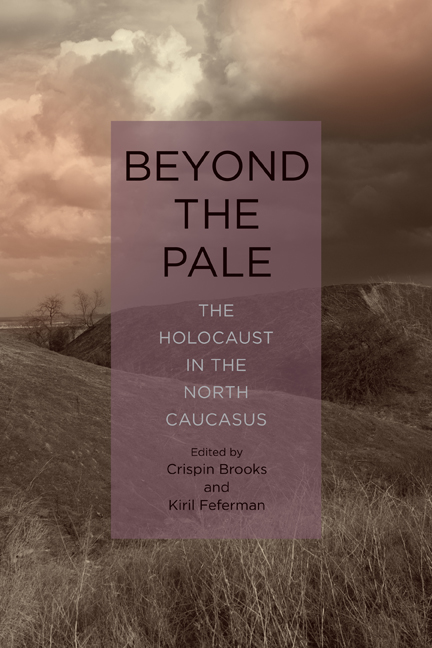Book contents
- Frontmatter
- Contents
- List of Illustrations
- Acknowledgments
- List of Abbreviations
- Note on Terminology
- Introduction
- 1 The Caucasus: A Rock in the Grinding Wheels of World History
- 2 Dwelling at the Foot of a Volcano? Jewish Perspectives on the Holocaust in the North Caucasus
- 3 “Operation Blue,” Einsatzgruppe D, and the Genocide in the Caucasus
- 4 The Kaukasier Kompanie (“Caucasian Company”): Soviet Ethnic Minorities, Collaborators, and Mass Killers
- 5 Mass Executions in Krasnodar Krai: Cross-Checking Sources for the Holocaust in the North Caucasus
- 6 In the Shadow of “Mass Treason”: The Holocaust in the Karachai Region
- 7 Rescue and Jewish-Muslim Relations in the North Caucasus
- 8 “We Were Saved Because the Occupation Lasted Only Six Months”: (Self-)Reflection on Survival Strategies during the Holocaust in the North Caucasus
- 9 The Holocaust on Soviet Territory—Forgotten Story? Individual and Official Memorialization of the Holocaust in Rostov-on-Don
- Glossary
- Bibliography
- List of Contributors
- Index
2 - Dwelling at the Foot of a Volcano? Jewish Perspectives on the Holocaust in the North Caucasus
Published online by Cambridge University Press: 06 October 2020
- Frontmatter
- Contents
- List of Illustrations
- Acknowledgments
- List of Abbreviations
- Note on Terminology
- Introduction
- 1 The Caucasus: A Rock in the Grinding Wheels of World History
- 2 Dwelling at the Foot of a Volcano? Jewish Perspectives on the Holocaust in the North Caucasus
- 3 “Operation Blue,” Einsatzgruppe D, and the Genocide in the Caucasus
- 4 The Kaukasier Kompanie (“Caucasian Company”): Soviet Ethnic Minorities, Collaborators, and Mass Killers
- 5 Mass Executions in Krasnodar Krai: Cross-Checking Sources for the Holocaust in the North Caucasus
- 6 In the Shadow of “Mass Treason”: The Holocaust in the Karachai Region
- 7 Rescue and Jewish-Muslim Relations in the North Caucasus
- 8 “We Were Saved Because the Occupation Lasted Only Six Months”: (Self-)Reflection on Survival Strategies during the Holocaust in the North Caucasus
- 9 The Holocaust on Soviet Territory—Forgotten Story? Individual and Official Memorialization of the Holocaust in Rostov-on-Don
- Glossary
- Bibliography
- List of Contributors
- Index
Summary
This stage of the Holocaust could have been avoided. The destruction of Jews caught in the westernmost part of the North Caucasus around the city of Taganrog could be somehow explained by the aftershock of the Blitzkrieg, although the Wehrmacht reached the area almost four months after the invasion. But the Jews killed by the Germans and their accomplices in the North Caucasus in the second half of 1942 should have survived. This was my conviction before I started to explore the Holocaust in this region, and it only grew in the course of my work on it, which culminated in my book. Jews in the North Caucasus were not crammed within the borders of European states whose Jewish subjects could only hope and pray that their governments would not cave in to German pressure (Bulgaria, Romania) or that their respective countries would not be seized by Nazi Germany (Italy, Hungary). Those European Jews had almost nowhere to go: their countries had borders that were protected, and even if they somehow managed to cross them, almost all of Europe was dominated by a Nazi Germany bent on finding and killing Jews everywhere it found them.
In contrast, by summer 1942, a considerable part of the Soviet Union remained under the control of the Soviet government. In the days immediately following the German invasion of June 22, 1941, it created and maintained an infrastructure for the large-scale movement of its population into the country's hinterland. By summer 1942, these facilities were still intact. Furthermore, from December 1941 to June 1942, the front line between Soviet and German forces at the southern sector of the Soviet-German front remained static, with Wehrmacht troops being deployed in the North Caucasus itself. Finally, up until summer 1942, Soviet Jews had numerous opportunities to learn from many different sources about the German mistreatment and extermination of their brethren. So if they knew why they should flee (Holocaust-related information and proximity of the Germans) and knew how to do it, why didn't all the Jews in the North Caucasus leave the region by summer 1942, preferring instead to “dwell at the foot of a volcano”?
- Type
- Chapter
- Information
- Beyond the PaleThe Holocaust in the North Caucasus, pp. 48 - 68Publisher: Boydell & BrewerPrint publication year: 2020



